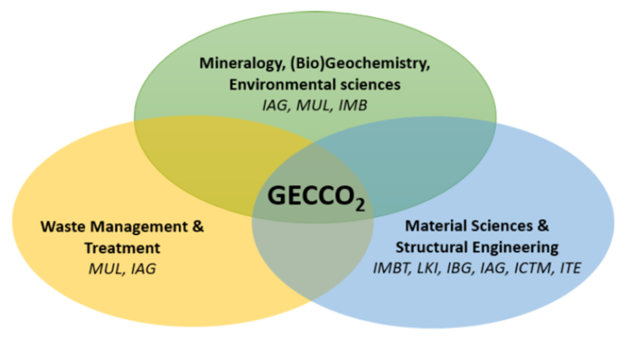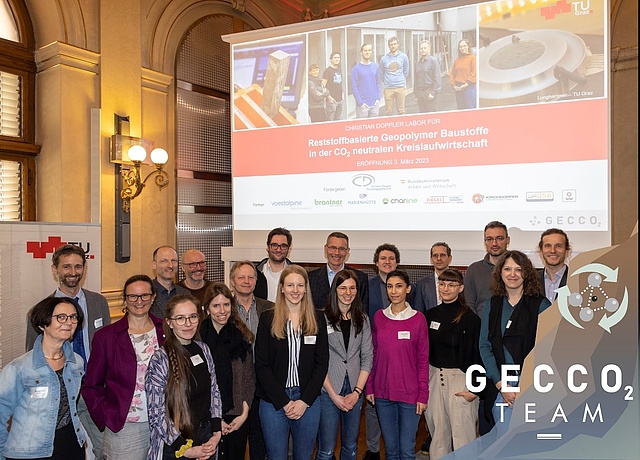Christian Doppler Laboratory for waste-based geopolymer construction materials
The Christian Doppler Laboratory for waste-based geopolymer construction materials in the CO2-neutral circular economy has been ceremonially opened in the Aula of TU Graz.
The aim of this research initiative is the establishment of a cutting-edge interdisciplinary competence center at the interface between waste, material, environmental, geo, and civil engineering sciences to develop a novel generation of waste-based geopolymer-based building materials with high (bio)chemical resistance following the concept of CO2-neutral circular economy.
Succeeding the overall strategy for a climate-neutral economy by 2050 as presented by the European Commission, within the proposed advanced material development inorganic industrial waste and residual materials such as slags, ashes, mineral wools, clay-rich residual demolition masses and clays are further processed (as binder and activator) and complemented with carbon-rich waste compounds such as (waste)oils, organic fibers or industrial biomass residues. This combination allows to minimize environmental impact of material production and thereby presents a major step towards carbon neutral building material development. Continuative material testing based on accelerated, standards-compliant test procedures, field studies and pilot projects represents another core area of the research initiative.
Therefore, advanced mineralogical, micro/nanostructural and (hydro)chemical analytics [e.g., X-ray and electron microscopy (FEG-EPMA, SEM, TEM), mass spectroscopy, X-ray microtomography, MAS-NMR etc.] will be linked with innovative monitoring tools (e.g., optical sensor systems, isotope/element tracers, fiber optic sensors) and complemented by experimental approaches, (micro)biological analyses, modeling and life cycle assessment calculations. Proposed material development and testing focus on reaction-specific processes at interfaces (liquid - solid - gas), proxy-based forensic reconstruction of physicochemical material properties and corresponding material adaptation to variable and possibly (in)favorable environmental and operational conditions.
This approach forms the basis for targeted and tailored optimization and development of durable, ecologically friendly, mineral-based building materials for the respective application areas. Envisoned application areas are (i) (bio)chemically aggressive systems in (waste)water transport and treatment, (ii) transport infrastructure [e.g. tunnel drainage systems, tension elements (prestressed/non-prestressed), supporting structures], and (iii) (bio)waste disposal and stabilization.
Industry partner: voestalpine Stahl Donawitz GmbH, Stahl- und Walzwerk Marienhütte GmbH, brantner green solutions GmbH, Initiative Ziegel, Research Association of the Stone and Ceramic Industry, CharLine GmbH, Kirchdorfer Fertigteilholding GmbH, MM-Kanal- Rohr- Sanierung GmbH and the Community of Styrian Wastewater Disposal Companies (including Linz AG and AWV Wiener Neustadt).
Researchers: Cyrill Vallazza-Grengg, Florian Mittermayr, Sara Raič, Florian Steindl, Stefanie Radinger, Bettina Ratz, Ognjen Rudić, Sylvia Perchthold, Iris Zögl and Jürgen Liederer.

Instiututes:
Advisory Researchers:
- Bernhard Freytag
- Joachim Juhart
- Matthias Rebhan
- Marcella Ruschi Mendes Saade
- Philipp Sedlazeck
- Klaus Doschek-Held
- Günther Koraimann
 |
 |
Christian Doppler Laboratory - GECCO2
Graz University of Technology
Institute of Applied Geosciences
Rechbauerstraße 12
A-8010 Graz, Austria
Dr. Cyrill Grengg
cyrill.grengg@tugraz.at
Phone: +43 316 873 6366

